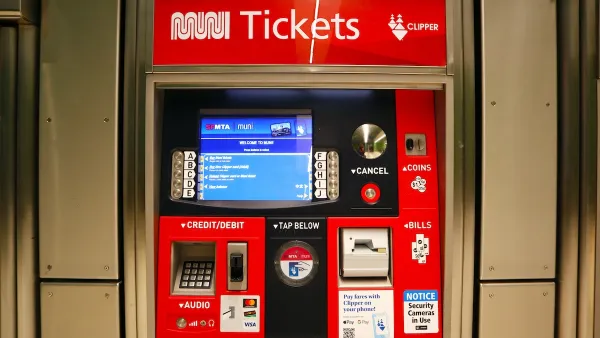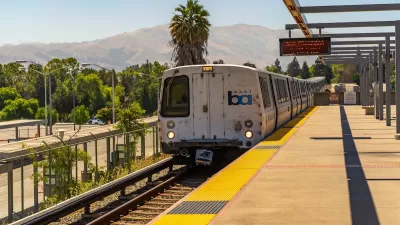Transportation officials in the greater San Francisco area have been debating a proposal to provide free public transit for low-income youth. They are now considering the possibility of basing fares on income, rather than age or disability.
"It makes all the sense in the world to provide discounts based on need, instead of age," said Ed Reiskin, director of the San Francisco Municipal Transportation Agency (SFMTA), which operates Muni. "Right now, we'd give almost a 70 percent fare discount to Warren Buffet. There is not a whole lot of logic in that." It does seem unfair that a wealthy senior can purchase a monthly pass for $22, when a young worker making minimum wage pays $64. The SFMTA is preparing a report on potential new fares for the 2013 budget season, and the Metropolitan Transportation Commission (MTC) is conducting a $1 million study of the issue. "We need to ask ourselves, if we're giving discounts, what kind should they be? Should it be for volume, or should it be based on economic need?" said Randy Rentschler, spokesman for the MTC.
The SFMTA currently provides a 50 percent discount on monthly fare for "residents whose income equals or falls below 200 percent of federal poverty lines," but "only 19,535 passengers use that system, which is burdensome and requires a lot of paperwork for the agency and its customers." The proposed income-based system would ideally cut down on the red tape and provide discounts for those most in need, said Reiskin, while also making the system more fair, efficient and cost-effective. Wealthier older riders would pay higher fares than lower-income young adults, and the reform could increase the accessibility of public transportation. Will Reisman adds, "While Muni and a handful of smaller transit agencies provide needs-based discount, the expanded proposal being pursued by the SFMTA would likely be the most robust program in the country."
Transit agencies in San Francisco have the infrastructure to move forward with the proposal, but Tom Radulovich, a board member of the Bay Area Rapid Transit, warns that "any such plan would face plenty of challenges." The agencies would need to agree on a cohesive discount fare policy amid their competing policies, and the policy changes could take years to be implemented. There are other issues including "stigma attached to riders who hold reduced-fare passes" and "the considerable doubts of senior transit passengers, who could revolt against any proposal that reduces their discount."
However, "[i]f our goal is to make transit accessible, especially for people of low income, it shouldn't be based solely on age, either young or old," said Cheryl Brinkman, a member of the SFMTA board of directors. "I love my parents, and they love getting the senior fare when they are in town, but they can afford to pay a full fare. Let's spend the money where the need is the greatest and let those who can afford to pay full fare do so, regardless of age."
FULL STORY: Muni and other agencies consider basing fares on income

Maui's Vacation Rental Debate Turns Ugly
Verbal attacks, misinformation campaigns and fistfights plague a high-stakes debate to convert thousands of vacation rentals into long-term housing.

Planetizen Federal Action Tracker
A weekly monitor of how Trump’s orders and actions are impacting planners and planning in America.

San Francisco Suspends Traffic Calming Amidst Record Deaths
Citing “a challenging fiscal landscape,” the city will cease the program on the heels of 42 traffic deaths, including 24 pedestrians.

Defunct Pittsburgh Power Plant to Become Residential Tower
A decommissioned steam heat plant will be redeveloped into almost 100 affordable housing units.

Trump Prompts Restructuring of Transportation Research Board in “Unprecedented Overreach”
The TRB has eliminated more than half of its committees including those focused on climate, equity, and cities.

Amtrak Rolls Out New Orleans to Alabama “Mardi Gras” Train
The new service will operate morning and evening departures between Mobile and New Orleans.
Urban Design for Planners 1: Software Tools
This six-course series explores essential urban design concepts using open source software and equips planners with the tools they need to participate fully in the urban design process.
Planning for Universal Design
Learn the tools for implementing Universal Design in planning regulations.
Heyer Gruel & Associates PA
JM Goldson LLC
Custer County Colorado
City of Camden Redevelopment Agency
City of Astoria
Transportation Research & Education Center (TREC) at Portland State University
Jefferson Parish Government
Camden Redevelopment Agency
City of Claremont





























